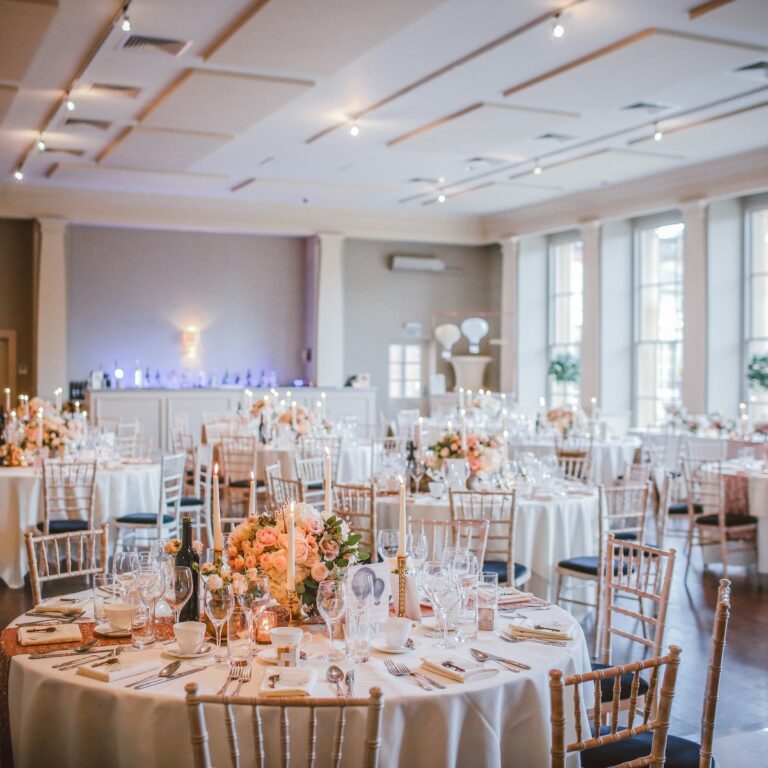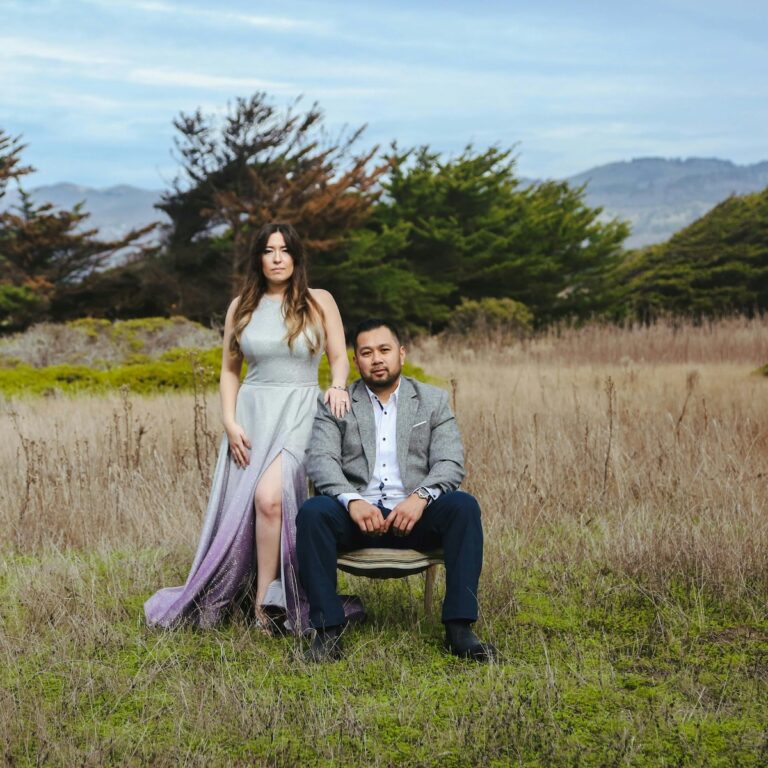Do you have to have a ceremony when you get married—or are you allowed to just skip to the good part, and have a reception?
The short answer is yes, you can absolutely have just a reception to celebrate your wedding. This saves some money, and allows for a more intimate wedding in many cases.
But what are the pros and cons of skipping the traditional ceremony and going straight to a reception? And what does it take to pull it off?
Pros and Cons of Skipping a Ceremony and Going Reception-Only
Pro: You save money on the ceremony costs.
Con: It’s not that much money, compared to the reception.
Generally speaking, ceremonies don’t cost all that much. The venue rental is sometimes built into the reception costs. As for separate ceremony sites, they usually aren’t priced highly—a few hundred for a church, or free in the case of many parks.
Beyond the venue, there’s some cost-saving elements like less floral, fewer decorations, and no need for wedding attire (unless you want to wear them, of course).
You also won’t need a videographer or photographer, unless you’re hiring one for your elopement or private ceremony.
Still, it does save some money. But probably not enough to make this your sole reason for skipping a ceremony.
Pro: You can have a more intimate-feeling ceremony.
Con: Some guests will be upset they missed the wedding.
Whether you choose to elope, go to the courthouse, or have a private ceremony, leaving out the crowd can bring a special intimacy to your wedding.
It can be just the two of you, an officiant, and some witnesses—or a few select family members and friends. Either way, getting married without hundreds of eyes on you appeals to plenty of couples.
That said, some of your reception guests will undoubtedly feel slighted. They wanted to witness your union, and might be upset they didn’t make the cut (even if you didn’t have anyone attend).
Other than assuring them that’s not the case, there’s nothing you can do here.
For whatever reason, some people just get mad when couples elope or have a private ceremony. That’s their issue to work on. You’re not responsible for how they choose to feel about your life choices.
Pro: You can get married way before the reception.
Con: You don’t get to celebrate right away, while it’s fresh.
To clarify, you can get married privately right before your reception, avoiding this particular “con” of ceremony-skipping.
But if you do choose to have a gap between your wedding and reception, be prepared for a different kind of party.
When you go straight from wedding to reception, your adrenaline is high. You spend the night on cloud 9, celebrating your latest milestone before it even has time to sink in!
However, if you get married weeks or months before the reception, the feeling has faded. You’re still happy, of course—but the reality of “I’m married” has had time to settle.
As a result, your reception might feel like more of a normal party.
That said, some couples adore that. It gives them time to settle their nerves, and actually enjoy the wedding and reception—instead of one big blur that’s over in just a few hours, it stretches out the fun.
Pro: You won’t have to stand in front of a crowd feeling vulnerable.
Con: There is something special about having loved ones witness our milestones.
At the risk of making any bride second-guess her decision to skip the ceremony and just have a reception…I have to mention possible regrets.
I get it: I hate crowds and the spotlight. I’d rather walk over molten Lego than read vows in public.
But still…there was something really sweet and beautiful about having all our loved ones in that venue, hearing us say “I do.” For me, that moment was worth all the embarrassment in the world.
If it isn’t for you, that’s okay too.
Pro: Most guests prefer the reception anyway, and will be thrilled at your decision to skip the ceremony.
Con: More than a few guests won’t realize they should still get you a present.
I was in a wedding years ago that had a tiny ceremony of only 10 people, but a reception a few hours later of 200. Not attending the ceremony was the groom’s great-aunt, who happily exclaimed, “This is the best wedding I’ve ever been to. I only got invited to the fun part!”
Personally, I love wedding ceremonies. Even if I don’t know the couple that well! I always ugly-cry and feel a newfound “faith in romance” feeling.
And I’m not alone: a lot of guests love weddings just as much.
But yes, a few find them boring, or neutral at best. They’re far more excited to attend the reception and party.
Many of your guests will fall into those same categories. While some will hate not witnessing the ceremony, others will be all too grateful.
And regardless of their feelings, not everyone will know to get you a gift.
For whatever reason, tradition hasn’t quite caught up to this new(-ish) wedding trend. A lot of people think they don’t have to give the bride and groom anything, if they weren’t invited to the ceremony.
This isn’t true, of course. But it’s also impolite to call anyone on it, so you’re stuck with the old “it is what it is” adage.
You can try and remind guests with a note about where you’re registered on the reception invites, but be prepared for some empty hands.
Alternatives to a “Skip the Ceremony” Kind of Wedding
To avoid some of the cons that come with skipping your ceremony, you might elect to try one of these “modified” weddings:
1. Get married privately at your reception venue, just before guests arrive.
I’m not talking about a secret wedding (that’s last, since it’s my favorite!), but rather a basic, trimmed-down ceremony your guests are fully aware of—just not attending.
A good way to word this on your invitations: “You are invited to attend the wedding reception of [Bride] and [Groom] at 6:30 pm on December 7, 2025, following a private ceremony.”
Doing your skip-the-ceremony wedding this way ensures you get the best of both worlds. A private, intimate wedding, followed quickly by an adrenaline-fueled party, while the “just married” feeling is still fresh.
2. Elope or do a courthouse wedding in the morning, then have the reception that afternoon.
Similar to the first option, you might decide to space the two out just a bit more.
Getting hitched in the a.m. and partying in the p.m. can work perfectly for couples who want a little breather in-between.
3. Have a small ceremony and larger reception.
If it’s the giant crowd and all eyes on you that makes you want to skip the ceremony, consider downsizing.
A small ceremony of 10 to 20 people falls right in that sweet spot between “alone” and “crowd.” And it’s your closest friends and family, so you’re less likely to get nervous.
This option also allows you to include your wedding party in your ceremony. For some couples, that’s a must-have.
4. Get married in secret, then invite everyone to your surprise reception—make them think it’s for something else!
A birthday party, a housewarming, a costume Halloween party like Parks and Rec: inviting your guests to an event that seems like one thing, but turns out to be your reception, is super fun and allows for creativity traditional receptions can’t always have.
Of course, some guests might be upset if they decline for what they think is a “small” event, but that turns out to be a marriage celebration. This downside is a minor one, in my opinion, when compared to all the fun you can have.
9 Ways to Pull Off a Reception-Only Wedding
1. Decide beforehand how and when you’ll get married.
There are a lot of ways to skip the traditional, big ceremony, each with pros and cons of their own.
Discuss the benefits and downsides with your fiancé. Consider your reasons for skipping the normal ceremony, as well: is it urgency (i.e., you want to get married quickly for benefits purposes, but celebrate in a few months)?
If so, a courthouse wedding or local elopement might be ideal.
Alternatively, if you really just want to avoid a big crowd staring at you go down the aisle, a very tiny ceremony with a handful of people could be the better fit.
Similarly, decide how long you’ll want or need the gap between your marriage and celebration. A year, to save up money? Ten minutes, to get privacy but still have a traditional-feeling reception?
2. Word it clearly on your invitations that this will be a reception-only event.
The example from earlier is great for most scenarios: “You are invited to attend the wedding reception of [Bride] and [Groom] at 6:30 pm on December 7, 2025, following a private ceremony.”
However, you might want to tweak your reception invitations if the party is a ways off from the wedding.
For example, if you elope in secrecy, you can announce your marriage and invite guests to the reception at the same time:
“The new Mr. and Mrs. [Last Name] invite you to celebrate their recent marriage. Please join them for a reception at….”
Obviously, the exception to this rule would be if you’re keeping everything a secret and pretending the reception is a party for something else, until guests arrive.
3. Don’t feel compelled to explain your decision (though you can, if you want to).
You don’t owe anyone explanations for how you choose to get married.
That said, people will ask. And criticize. Or have their feelings hurt. It’s entirely up to you, however, if you choose to explain why you skipped a traditional or large ceremony.
Sometimes this helps people feel less slighted and upset; sometimes it doesn’t. Either way, you don’t control their emotions—so be prepared to end the conversation if someone simply refuses to see your POV. They don’t have to agree with your choice to respect it.
4. Specify the dress code, if applicable.
Again, reception-only weddings are tricky. The decorum naturally built into weddings sometimes falls away, because you’re already doing something pretty non-traditional.
But just because you’re bucking one tradition doesn’t mean you want to throw them all out. So if you want a formal reception, make sure you choose a dress code that suits that—and write in on your invitations.
Black tie, semi-formal, “Sunday best,” and a slue of other formality options give guests at least some idea of what to expect.
If you don’t specify, you run the risk of people showing up in flannels and jeans.
Not that there’s anything wrong with that! Some brides prefer the casual feel for their receptions. But you should still clarify.
The reverse is true, too: tell guests if the attire should be casual. No one wants to show up to a barbecue dressed to the nines when the rest of the party’s in Levis.
5. Still splurge on what matters: the guests’ enjoyment.
Your ceremony is for you two. That’s true whether it’s a church packed with 200 people, or an intimate waterfall wedding with almost no one nearby for miles.
But the reception? That’s for your guests.
Yes, it’s to celebrate the marriage. But it’s also a way to thank your guests.
Not for attending your ceremony, in this case—but for all the support and love they’ve give you through the years, and will continue to give you.
With that in mind, don’t skimp on food, beverages (alcoholic or not), and music or other entertainment.
You don’t have to get fancy if that’s not your style. And a low budget is still fine to pull this off.
Just don’t forget those three basics. They’re not so much tradition as they are pillars of great hosting—and that’s what the reception is about, no matter what form it’s taking.
6. Don’t expect gifts from everyone, but do feel free to register anyway.
Put simply, some guests will assume (wrongly) they don’t need to give presents if they don’t attend your ceremony.
You can’t call them out on this. Some people do it out of honest ignorance; others, spite. Whatever the reason, it’s rude to ask outright that people give you wedding presents.
You can and should, however, register for gifts the same way you would before a traditional ceremony. You can even put “The bride and groom are registered at…” on separate cards in your invitations, to remind would-be non-gifters that this tradition still holds up, ceremony or not.
7. Wear your wedding clothes, or similar outfits (if you want to).
I’m a big believer in the little details.
Just as a splash of vanilla completely changes a recipe, a dash of tradition can transform your reception from “party” to true “wedding celebration.”
If you just want a low-key party, that’s fine—and you’re obviously free to wear whatever you like!
But consider wearing the same outfits you did when you got married, or at least attire that has a similar “bride and groom” feel.
And don’t feel compelled to go formal if that doesn’t match your reception style. A white sundress is still casual, but will make you (and your guests) remember this party is to celebrate something special.
Can I Still Have Bridesmaids If I’m Doing Courthouse, Elopement, or a Private Wedding?
Yes, you can still have a wedding party—even if you aren’t having a traditional wedding!
It’s up to you what your bridesmaids’ roles should look like, and if they’ll attend your ceremony.
This is true whether it’s at a courthouse, a local destination, a far-off elopement, or a private room at your reception venue before the rest of the guests arrive.
As for their role, they can stand beside you at the altar (or in the courthouse) if you want them to. But if your ceremony is super tiny, or you’re eloping just as a couple, you might need to get creative.
Your wedding party members can give speeches at your reception just the same. They can read poems or Bible verses, just as some do during wedding ceremonies.
Don’t forget the pre-wedding events, either: even if you skip the ceremony, that doesn’t mean you can’t have a bachelorette weekend or bridal shower!
Finally, your wedding party can simply take on honorary meaning. They may not have a role, or matching clothes—but the title can still give them a sense of importance on your big day, if you choose to have them.
(PS: You can even add a wedding party member at the last minute, if need be! Just keep in mind their role will need to be modified for the short notice.)
Your Wedding Can (and Should) Look However You Want it To
Ultimately, only you and your fiancé can decide what ceremony style is right for you.
Big, small, elopement or courthouse: there’s really no wrong way to go. It’s all about what suits your personalities best.
And no matter what you choose, skipping a traditional ceremony doesn’t mean you have to skip the traditional, grand reception. You can keep both components casual, mix up the formality levels—whatever you want. Just keep guests informed as applicable.









